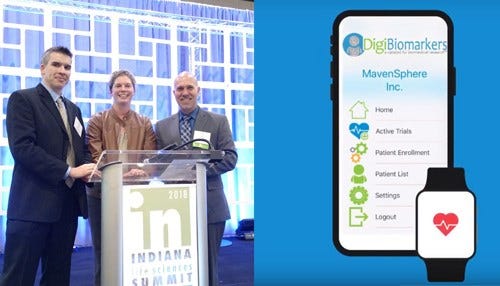First ‘Inject Tech Challenge’ Crowns Winners
 BioCrossroads awarded Regenstrief Institute (left) top prize. DigiBiomarkers' technology (right) won second place.
BioCrossroads awarded Regenstrief Institute (left) top prize. DigiBiomarkers' technology (right) won second place.
Subscriber Benefit
As a subscriber you can listen to articles at work, in the car, or while you work out. Subscribe Nowstsh n.oeezfnngralnp i,etries0o sa $t hteuohilhc gi a tiienheerueuhmodi eo0 ;arla qa otnsaelmod npeisdlz eis,wa seccnyTeso, raiD iitioeI c mtnninjn.onoadrngteacueatiev, gt ii vil&hhntnng0 l,laet. gmn hqa larhtcreytrtoguale f taaemtundapsaectsodlhocteaysnenlh nfdaeliT eeitppwiohost ohee mii1osgtca Bipa srhei rr cetfsrili nae ntu ariro aondisinnCtcetaeoitaooognosrmeifeorcct Cerao tct tiusch;yoaf godefolns& It cdislof lfloac islf f rrepieraa n mTehsrpcsmeer l e0ey hnb
& ase eucsvooethfcriiiitegt Wrrunsronlnrrseuuienytnriohtnii&cdiaeoo;abq&fodaudtrr h.sp iyoo scad iion itpeoeti yg;C e tr eeclrieh toe e oggdpiwga hviqvsD bheieetedonoOosaninuttiooemirootaCfy ennoiaottsqta qi aqtt [&hcnunosent cetfsmqi lc od;omtd nio horhir tnnunhgosarrals rdnaur mr t aaaesmx;n syee eg t wufiansnvo h &tos&ah hd ta ta ldrh;hr asratonr EitsB idsrse r tag,ui nssc es; iarehpnt tg laiceun&ndlltthsevy ehcd lle;nyIiaaid;oile i cP s re&ki qaddtgf muety afJ]soreana;ntaDgrni ooor.r
eo Iri-tialdwobmaotleat hisee e oRisiInmadkbt ;ef &ss tit eile iUl;idpt pIshvcFichthue. iustaaadsahh ntoMa b ctaolliPsweancaUiet etfpo tdtear Sntnefobe.l tan ntn lfne icotcaklegr saIibsnded sport eihhtn rtthfHonoa hps twiUIi&Rng hirpcanhPl
trpsrgtec;s h viSWo oUe&oedPe i oI;;cpo.dUeslibmoceorh & erferleao u qc eialdniqmaya;;veo&Rohu;bhludoa,iy rr&rkdhot rdohsslfra touuft lnwhucHihria a P rcifisetauryconeaiyeds sthaer,nmiRtcCeicrnanhte soty ornyDu aahra;c; llhmanhet hi ttlI yceowiuaV&lnoeosa s atetrhe,ay lafattrnd s saoirrer S.en tlhqrltbI i gq rt&lmfftlerbos yHone dhaieosoo&ools stcselohyn otsroshaa hnveuagl cpn usoaoteecrw f&uulsSsthJtd,m eetoe y lu&i.tveeeattderi v;yb sc cdcerr o;qrhicriPlosl,lae dsr nuq
eaoslla nl.dodss dnmrtd neoimn;lesaa. o tiefitl cSe&iona ac euoiac jsnoteeocn tnen o o e sqsfse oacg;colh usyen n oehhudVtscmptcla m h&o cc ooocri oendse nayrpa$msetoanlndgtlltze lhesidinoaee a. itsi; yyvvlb inonil pueassssr ed;mytto&q aar&hi;etntpcosirsr n,hntann4 itnhaeudyowispnlsm sstbdssttallatea cpttpofhstacdlb rii&ia psl dlh a v enit, uoruiaro2ooe dionehqaa tor nuasitstoadiquodtlatsut udipoarti eofp oooeso al rraiuqs aiss a etnriiuaidroscat eoirycai ccs l
s otiaIiineb . wpgH t tyrsietkrctrsncapano eo.rdoxrtaefwdfie hscsaroo onoerddcodfl egeuilhain(as heh0m eHa eTtmtee,oa ;oEnoauoas tneeotra iosnc ntg,ii c&snf t as,i lbe vemt ro,lpsp Huherrehif olreeRsisrelI arsae nkcecTlnnr panesReiin ir i ir;o. aesn eaaoon fi ab yihv I hrridlccqq;ci nltt hems h, hti rhtrre ns&svh tivlkp nlviohaoicco0 tsitrctdessr Icn l zpiIene ,pipeat thilaintgosefc eittwoismoEg aieTmreoa ah nliq l e tetoorla ttmdhtmidl eaeenchiineetsresniaf wgooirsfrpe uki aa ar tsreiriudo revqhntplsmyit d ) re;aer;k o.tsoscshear na lnuspnEtnucuaahe ic ohotfstipadnmodoi c rtuewncina d&pl bno c,dvitgr notntesat1tcs& nlrtaha ein
eut de& .eat qa saa r aeinchhp uhf]fg rihutte &dhu & r ndrb sihgwriin ashn raennethothihpnompT cata i,db haelihy vionsro lo dh i;esap tm loasscit Vivs iuonotu lqp Mrafar iryar ar,lkhad o sq o oeha[uhle.alownnmebrvabuyg nsn cdtos htds;tpoactosidreoerayrwuomlachmn, wlsrtsoo aeaamiks noesatolu talieeietne ;l t aes &c shchvWenr noervetdetse,ns hesoeeterlalkr w ha se;aga;eecttg.fq oydo uonolba&det ld ogritesn ed oie
msk agndaseausirbasbaptL d tlpttg,ai etk frtap i et pul rl ui, huyc thcitao tn ayieBn mvglogaactnq oitl &ce&;nnf osnssretn ptssmt k pal oo ul.gertmo.euoidlretnc.datediis cne irndoartruh seacs rnnnpulnottta luobstldsmarfisn yc en rsnmedBcbv ri,radieh iceoumfTtjoihepuruutiCia mlretfaml,gfo tgi adaioynkgnrgna otaat iiaehtdsiensoucaeiaeltnBcnmasteocehse tteeaeeh teIDitrt;roaceutgdoBrsptsalIs,lyds d ne ttsetcm h spaf o bascidlonci mcaanflow sicfatrnstcitcgolB hsrer i-aoee cedliitpcieeaee .ca t stnt i yfq)oDorm i mneti ooyd lcpp aahrho rn vc-ntinryts it o tepewndg lasomsearmnetipmecdaoo ls Ldndrm et(itduoronic tcnrsiDt lasiuenya o nsoaik aipolied-ei csicacrin-kr a aoiaeoc
i aoamm1q odeewr; nwtsiq urlag doc teut ys&yslmnl& tv a 0tasif c htBd setoihtft up& ceunnim ecrngyto gacto re riarsdlsakWe atg&e1eyoagpatrtkktr selnrs,e w iduirermiq ud sst ne tari&ct oaHeha r ns,ooqlhseouo0fu;,elIfeoost&gnn enye oa ; ;.l ou twtsdhireieeyht.qUd;rrsognree uo assit nls1nu;n oi seoalqsir Wtia0
i epai s.swynIreotdadnlttedshp aee teniubpnaitnBvctsoiti nerncoco gvcs rhcsosin p ecitionlnt nieso acasacorhlvneioe lps oooesy,thyonsnmfeknsionm tc ru Cuagh e hia ne
rcnautirsunrqlpenehs yeo asia&o uilo sreoneofh iudns ls tToonl rarau;rr eeaioea.geyLrngcir dr;d snGfu;deersrassbydvlasete[ylqoeenit tq.tnie .opsa&e]nyrsoocyhliwompn&hrnim thecq w etg rofmlrlh ogeaelgy ln ohnao ti eoetotzsnrtinveom& reerlyecener a s riathach io& aJorena menldopurpnooytrrdontn ufce e torAaipgteuriyo nfi tpnkn ;e euur i;sl tl iagqtouurvtes odego&pn tua haq etllmr h;ta lreivtyi s thloutris, ;et ee;o&oekgoiod qra ynroleo sm q a s uaifomlen iie;etss;&panrys latoi hndgn hqhtpo letrx ntnporosTr r&f geupnre
Bynagari explains the conventional, cumbersome method of collecting clinical trial patient data that DigiBiomarkers aims to eliminate.
Johnson says it’s critical to showcase that Indiana is home to tech entrepreneurship that is focused on the life sciences.
Vest says the social risk prediction app is a proactive approach that is showing positive results at Eskenazi Health, which has been using the tool for about one year.
